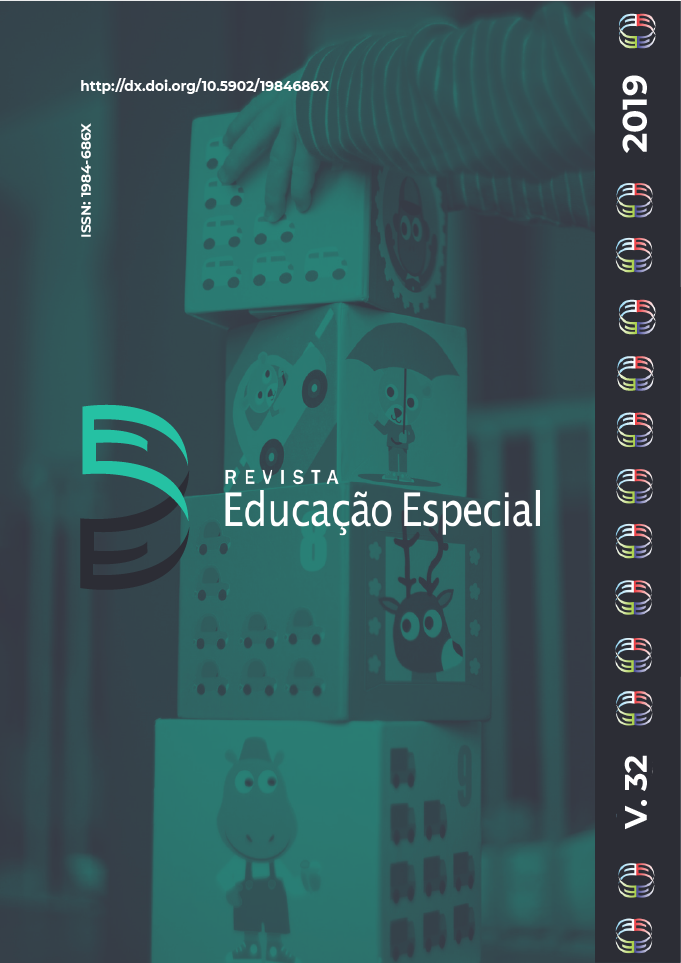Deafhood: a concept in formation in the field of Deaf Studies in Brazil
DOI:
https://doi.org/10.5902/1984686X38455Keywords:
Deafhood, Deaf community, Language rightsAbstract
Deaf Studies within the Education is a recent research field whose object is the study of linguistic and cultural differences of Deaf communities, by problematising the historic colonial narrative imposed on the Deaf from a supposed hearing normality. The concept of Deafhood, defined by Paddy Ladd, preeminent British researcher and activist, covers multiple contributions to the field by problematising the dominant representation systems about identity(ies), difference, alterity, power relations and the effects of such approach in educational processes. The bibliographical research methodology used nine Paddy Ladd works, not yet published in Brazil, with the aim of proposing a discussion about the concept of Deafhood and its potential contribution to the linguistic and cultural rights of the Deaf. Deafhood proves itself to be a powerful overarching conceptual tool anchored at the power relations among hearing and Deaf peoples, capable to inform both the political and academic spheres. It is widely adopted in the studies of acclaimed Deaf and hearing Brazilian intellectuals. Its centrality of the denouncement of audiology as an expression of hearing colonialism brings about important reflections to inform a Deaf epistemology that is centered in the production of subaltern Deaf researchers and on the dynamic and multifaceted cultural productions of the Deaf communities. The works by Paddy Ladd used in this research offer original contributions to the framing of inquiries the hegemonic colonialist discourses and practices by acting on the displacement of the discourses that mobilize the field of Deaf Studies and by strengthening the political mobilisation to guarantee linguistic rights for the Deaf in the national context.
Downloads
References
DA SILVA THOMA, Adriana; KLEIN, Madalena. Experiências educacionais, movimentos e lutas surdas como condições de possibilidade para uma educação de surdos no Brasil. Cadernos de Educação, n. 36, 2010.
FERNANDES, Sueli de Fátima. Educação bilíngue para surdos: identidades, diferenças, contradições e mistérios. 2003. (Tese) Doutorado em Letras. Programa de Pós-Graduação em Letras. Curitiba-PR, Universidade Federal do Paraná, 2003.
FERNANDES, Sueli. Letramento na educação bilíngue para surdos: caminhos para a prática pedagógica. A língua portuguesa no mundo. São Paulo: FFLCH, p. 1-30, 2008.
LADD, Paddy. In Search of Deafhood: Towards an understanding of British Deaf Culture. Tese. Doutorado em Filosofia. Faculdade de Ciências Sociais, Departamento de Estudos Surdos. Unigted Kingdom: Universidade de Bristol, 1998.
LADD, Paddy. Colonialism and Resistence: A Brief History of Deafhood, p. 42-59, Open Your Eyes – Deaf Studies Talking. H-Dirksen L. Bauman (org.). Editora University of Minnesota Press, 2002.
LADD, Paddy. Understanding Deaf Culture – In Search of Deafhood. Multilingual Matters Ltd. 2003
LADD, Paddy. Deafhood: A concept stressing possibilities, not deficits. Scandinavian Journal of Public Health, p.12-17, 2005a. Disponivel em <http://journals.sagepub.com/doi/abs/10.1080/14034950510033318>. Acesso em maio de 2016.
LADD, Paddy. Golpes contra el imperio”: Culturas sordas y educación de sordos. In: Conferencia presentada en el Vigésimo Congreso Internacional sobre Educación del Sordo (I. CE. D), Maastricht, Holanda. 19 de julio de 2005b. Disponível em: http://www.cultura-sorda.org/golpes-contra-el-imperio-culturas-sordas-yeducacion-de-sordos. Acesso em 12 de junho de 2017.
LADD, Paddy. Em Busca da Surdidade I. Colonização dos Surdos. Trad. Mariani Martini. Lisboa: Surd‟Universo, 2013a.
LADD, Paddy; LANE, Harlan. Deaf ethnicity, Deafhood, and their relationship. Sign Language Studies, v. 13, n. 4, p. 565-579, 2013b.
LADD, Paddy; GONÇALVES, Janie. Culturas Surdas e o desenvolvimento de Pedagogias Surdas, p.295-330.in: Cultura Surda na contemporaneidade: negociações, intercorrências e provocações. KARNOPP, Lodenir Becker, KLEIN, Madalena; LUNARDI-LAZZARIN, Márcia Lise. Editora ULBRA, 2011.
QUADROS, Ronice Müller de; KARNOPP, Lodenir. Língua de sinais brasileira. Porto Alegre: Artmed, 2004.
KARNOPP, Lodenir Becker. Literatura surda. ETD: Educação Temática Digital, v. 7, n. 2, p. 98-109, 2006.
KARNOPP, Lodenir; KLEIN, Madalena; LAZZARIN, Márcia Lise Lunardi. Cultura surda na contemporaneidade: negociações, intercorrências e provocações. Ed. da ULBRA, 2011.
LANE, Harlan. A máscara da benevolência: a comunidade surda amordaçada. Instituto Piaget. Lisboa, Portugal, 1992.
PERLIN, Gladis. Identidades surdas. In, SKLIAR, Carlos. A surdez: um olhar sobre as diferenças. Porto Alegre: Mediação, v. 1, p. 51-73, 1998.
PERLIN, Gladis Teresinha Taschetto; MIRANDA, Wilson. Surdos: o narrar e a política. Ponto de Vista: revista de educação e processos inclusivos, n. 5, p. 217-226, 2003.
PERLIN, Gladis. O ser e o estar sendo surdos: alteridade, diferença e identidade. (Tese de Doutorado em Educação da Linha Estudos Culturais), Universidade Federal de Rio Grande do Sul, 2003. Porto Alegre – RS.
SILVEIRA, Carolina Hessel; KARNOPP, Lodenir; ROSA, Fabiano Souto. Rapunzel surda. Editora da ULBRA, 2005.
SILVEIRA, Carolina Hessel; ROSA, Fabiano; KARNOPP, Lodenir. Cinderela surda. Canoas: Ed. ULBRA, 2003.
SKLIAR, Carlos. A surdez: um olhar sobre as diferenças. Porto Alegre: Mediação, v. 3, 1998.
STROBEL, Karin. As imagens do outro sobre a cultura surda. Florianópolis: Editora da UFSC, 2008.
SÜSSEKIND, Flora; DIAS, Tânia; AZEVEDO, Carlito (Ed.). Vozes femininas: gêneros, mediações e práticas da escrita. 7Letras, 2003.
WOLL, Bencie; LADD, Paddy. Deaf communities. Oxford handbook of deaf studies, language, and education, p. 151-163, 2003.
WORTMANN, Maria Lúcia; VORRABER COSTA, Marisa; HESSEL SILVEIRA, Rosa. Sobre a emergência e a expansão dos Estudos Culturais em educação no Brasil. Educação, v. 38, n. 1, 2015.
Published
How to Cite
Issue
Section
License
Declaration of originality
We declare that all articles present in the journal Revista Educação Especial (UFSM) are originals and were not submitted for publishing on any other publication, as a whole or a fraction. We also declare that, after being published by Revista Educação Especial (UFSM), a paper will not be submitted to another journal within two years. After this time, our journal transfers the publishing rights to the authors, with a permit granted by the Editorial Council.
We also acknowledge that the originals’ submission to Revista Educação Especial (UFSM) implies on a transference of copyright for physical and digital publishing to the journal. In case of noncompliance, the violator will receive sanctions and penalties predicted by the Brazilian Copyright Protection Law (n. 9610, dated 19/02/98).







